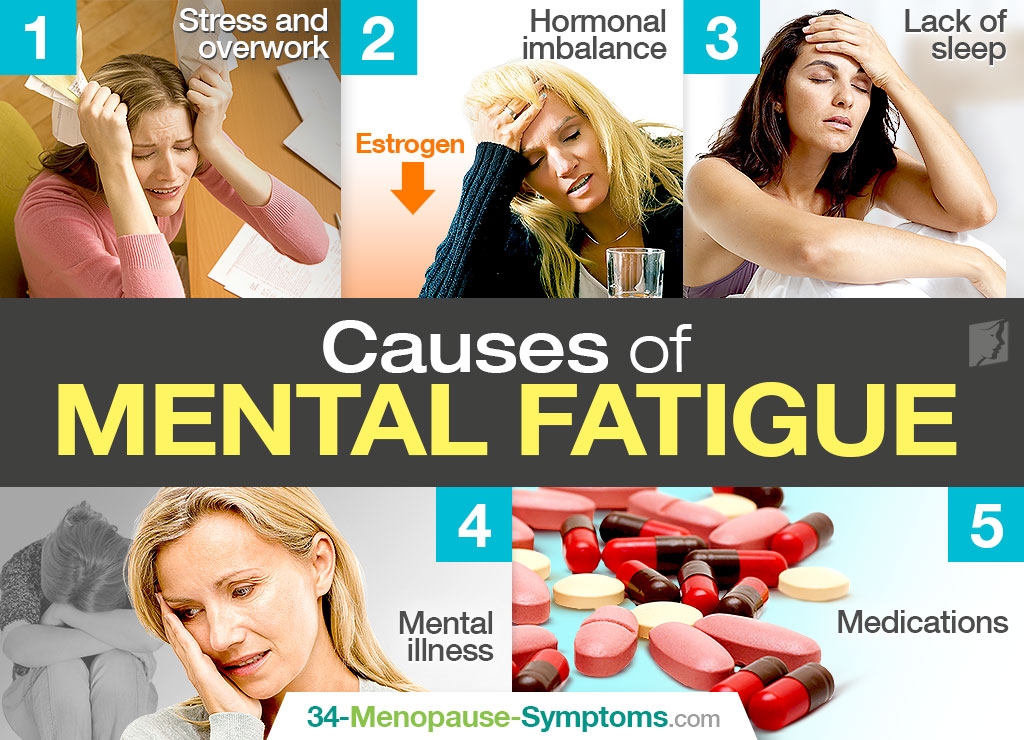Often, people think of tiredness and fatigue as a physical feeling, such as the feeling after a long workout. However, fatigue can be mental as well, and can exist even when the body is rested and energetic. Mental fatigue can be difficult to diagnose because it is so subjective, but it is a real problem than can affect women's daily lives.
Causes
Most of the time, fatigue can be traced to one or more daily habits. Fatigue is a feeling of weariness, tiredness, or lack of energy. Here are some causes of fatigue:
Stress and overwork. The most common reason to become mentally fatigued is to spend too much time focusing on difficult problems or work. The brain can only do so much work at a time, and overwhelming it is likely to lead to mental tiredness.
Hormonal imbalance. Women who are experiencing menopause are also experiencing a change in hormone levels, and especially a change in estrogen levels. This not only alters sleeping patterns, but it can also add a level of mental fog for women to overcome in their daily life.
Lack of sleep. Without enough rest, the brain can't keep functioning at the normal level, and its performance will begin to suffer. Sleeping less than seven hours a night is too little and will begin to show consequences over time, and some people may even need more than seven hours.
Mental illness. Some mental illnesses can cause other problems in the brain as well aside from their direct symptoms, and mental fatigue is one of the most common issues to arise in people dealing with mental illness.
Medications. Some medications have side effects of fogginess or exhaustion that can affect the brain and cause mental tiredness.
Symptoms
Mental fatigue symptoms are often more than simply feeling tired. There are real, noticeable consequences of mental fatigue, including:
- Reduced productivity at work or school
- Confusion or frustration at simple tasks
- Difficulty concentrating
- Memory problems
- Excessive anxiety
- Irritability
Treatments
For mental tiredness, some simple management methods may be able to reduce symptoms of mental fatigue and help to improve mental energy. Even for those without a medical issue, trying to implement these changes can be beneficial for their daily life. Although some of these lifestyle changes may not get rid of mental fatigue altogether, they can help make it more manageable. These lifestyle changes are:
Rest your mind
This is usually as simple as just feeling the physical sensation of my body standing, and doing some slow breathing. You can pay attention to any physical sensation—e.g., the feeling of your feet making contact with the ground, or the positioning of your hips or shoulders.
Reduce stress
Take steps to reduce the excess sensory input you encounter in a day-to-day life. For example, wear headphones on the subway, turn off the TV when you're not watching it, use night shift mode on your phone, or get some blackout curtains. Do whatever will reduce excess, unpleasant sensory input in your life.
Exercising regularly
Exercise improves mental health by reducing anxiety, depression, and negative mood and by improving self-esteem and cognitive function. Exercise has also been found to alleviate symptoms such as low self-esteem and social withdrawal.
Mental fatigue treatment may depend on the underlying issue that caused the mental fatigue to emerge. For an illness or something involving medication, a doctor's advice should be sought. To learn more about fatigue and how to manage the symptoms, read about the right foods to eat to keep fatigue at bay.
Sources
- Mayo Clinic. (2016). Fatigue. Retrieved May 12, 2017, from http://www.mayoclinic.org/symptoms/fatigue/basics/causes/sym-20050894
- National Institutes of Health. (2015). Fatigue. Retrieved May 12, 2017, from https://www.nlm.nih.gov/medlineplus/ency/article/003088.htm
- National Institute on Aging. (2015). Fatigue: More Than Being Tired. Retrieved May 12, 2017, from https://www.nia.nih.gov/health/publication/fatigue
- Psyschology Today. (n.d.). 5 Ways to Overcome Mental Exhaustion. Retrieved May 12, 2017, from https://www.psychologytoday.com/blog/in-practice/201604/5-ways-overcome-mental-exhaustion
- Sharma, A; Madaan, V; Petty, F. (n.d.). Exercise for Mental Health. Retrieved May 12, 2017, from https://www.ncbi.nlm.nih.gov/pmc/articles/PMC1470658/




